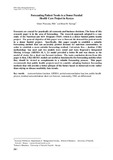| dc.contributor.author | Wainaina, Gituro | |
| dc.contributor.author | Njoroge, Brian M. | |
| dc.date.accessioned | 2013-09-11T13:24:06Z | |
| dc.date.available | 2013-09-11T13:24:06Z | |
| dc.date.issued | 2013-08 | |
| dc.identifier.citation | DBA Africa Management Review, August 2013, Vol 3 No 2. Pp. 24-39 | en |
| dc.identifier.uri | http://journals.uonbi.ac.ke/damr/article/view/1162 | |
| dc.identifier.uri | http://erepository.uonbi.ac.ke:8080/xmlui/handle/123456789/56364 | |
| dc.description | Full Text Article | en |
| dc.description.abstract | Forecasts are crucial for practically all economic and business decisions. The focus of this
research paper is in the area of forecasting. The research approach adopted is a case
study of the Nutrition and HIV Program (NHP), which is a donor funded public health
project. The general objective of this paper was to forecast the demand for patient needs
in a donor funded project. Specifically, this paper sought to establish a suitable
forecasting method that can accurately predict demand for nutrition commodities. In
order to establish a more suitable forecasting method, Univariate Box – Jenkins (UBJ)
methodology was used and two models were tested and Auto Regressive Integrated
Moving Average (ARIMA (0, 1, 2)) model provided a better fit and was chosen as the
model of choice for a short run forecast horizon. The main conclusion drawn from this
paper is that, UBJ-ARIMA models are useful as benchmarks for forecasting and therefore
they should be viewed as complements to a reliable forecasting process. This paper
recommends that public health projects need to consider adopting business forecasting
methods that will provide a better glimpse of the future based on historical events rather
than relying on disease morbidity data trends. | en |
| dc.description.sponsorship | University of Nairobi, School of Business | en |
| dc.language.iso | en | en |
| dc.publisher | DBA Africa Management Review | en |
| dc.subject | Auto-correlation function | en |
| dc.subject | Partial auto-correlation function | en |
| dc.subject | Residual auto-correlations short run forecast | en |
| dc.subject | Public health project | en |
| dc.subject | Un-differenced | en |
| dc.subject | Stationarity | en |
| dc.subject | ARIMA | en |
| dc.subject | UBJ | en |
| dc.title | Forecasting Patient Needs in a Donor Funded Health Care Project in Kenya | en |
| dc.type | Article | en |
| local.publisher | School of Business, University of Nairobi | en |

